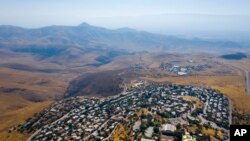The visa measures amount to a rare concrete repercussion by the United States against Israelis in the nearly two-month-old war, in which President Joe Biden has nudged the U.S. ally privately but also promised strong support.
"We have underscored to the Israeli government the need to do more to hold accountable extremist settlers who have committed violent attacks against Palestinians in the West Bank," Secretary of State Antony Blinken said in a statement.
"As President Biden has repeatedly said, those attacks are unacceptable," he said.
Blinken said the United States would refuse entry to anyone involved in "undermining peace, security or stability in the West Bank" or who takes actions that "unduly restrict civilians' access to essential services and basic necessities."
"Instability in the West Bank both harms the Israeli and Palestinian people and threatens Israel's national security interests. Those responsible for it must be held accountable," Blinken said.
State Department spokesman Matthew Miller said that dozens of settlers, who were not publicly named, would be affected. The visa ban also applies to their immediate family members.
Restrictions on entering the United States will not apply to extremist settlers who are US citizens.
Wave of violence
Hamas militants stormed out of Gaza into Israel on October 7, killing around 1,200 people, mostly civilians, and taking around 240 hostages, according to Israeli officials.
In response, Israel vowed to destroy Hamas and has carried out air strikes and a ground offensive that have killed around 15,900 people, mostly women and children, according to the Hamas-run health ministry.
Even though Hamas does not control the West Bank, some 250 Palestinians have been killed there by Israeli soldiers and settlers since October 7, according to a Palestinian government tally.
"We have underscored to the Israeli government the need to do more to hold accountable extremist settlers who have committed violent attacks against Palestinians in the West Bank," Secretary of State Antony Blinken said in a statement.
"As President Biden has repeatedly said, those attacks are unacceptable," he said.
Blinken said the United States would refuse entry to anyone involved in "undermining peace, security or stability in the West Bank" or who takes actions that "unduly restrict civilians' access to essential services and basic necessities."
"Instability in the West Bank both harms the Israeli and Palestinian people and threatens Israel's national security interests. Those responsible for it must be held accountable," Blinken said.
State Department spokesman Matthew Miller said that dozens of settlers, who were not publicly named, would be affected. The visa ban also applies to their immediate family members.
Restrictions on entering the United States will not apply to extremist settlers who are US citizens.
Wave of violence
Hamas militants stormed out of Gaza into Israel on October 7, killing around 1,200 people, mostly civilians, and taking around 240 hostages, according to Israeli officials.
In response, Israel vowed to destroy Hamas and has carried out air strikes and a ground offensive that have killed around 15,900 people, mostly women and children, according to the Hamas-run health ministry.
Even though Hamas does not control the West Bank, some 250 Palestinians have been killed there by Israeli soldiers and settlers since October 7, according to a Palestinian government tally.
The Palestinian Authority holds limited autonomy in the West Bank where Palestinians have complained of impunity over attacks and harassment carried out by settlers, some of whom have been serving in the Israeli military as forces are shifted to Gaza.
Prime Minister Benjamin Netanyahu is in a coalition with far-right parties that strongly support Jewish settlement of lands seized in 1967, construction that is considered illegal under international law.
Blinken visited both Israel and the West Bank last week just as a pause ended between Hamas and Israel.
The State Department said that Israel has shown "improvement" in targeting its strikes in Gaza as it voiced concern about a repeat of the widespread bombing at the start of the war.
"We will continue to monitor what's happening and will continue to press them to do everything they can to minimize civilian harm," said Miller, the State Department spokesman.
The United States has also promised more than $100 million in humanitarian aid to the Palestinians but has faced strong criticism in much of the Arab world for its diplomatic and military support of Israel.
Prime Minister Benjamin Netanyahu is in a coalition with far-right parties that strongly support Jewish settlement of lands seized in 1967, construction that is considered illegal under international law.
Blinken visited both Israel and the West Bank last week just as a pause ended between Hamas and Israel.
The State Department said that Israel has shown "improvement" in targeting its strikes in Gaza as it voiced concern about a repeat of the widespread bombing at the start of the war.
"We will continue to monitor what's happening and will continue to press them to do everything they can to minimize civilian harm," said Miller, the State Department spokesman.
The United States has also promised more than $100 million in humanitarian aid to the Palestinians but has faced strong criticism in much of the Arab world for its diplomatic and military support of Israel.










Forum